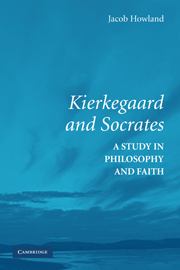Book contents
- Frontmatter
- Contents
- Note on Texts and Translations
- Acknowledgments
- Kierkegaard and Socrates
- Introduction
- 1 Johannes Climacus, Socratic Philosopher
- 2 Climacus's Thought-Project
- 3 Platonic Interlude: Eros and the God
- 4 Climacus's Poetical Venture
- 5 The Paradox and the Passion of Thought
- 6 Self-Love and Offense
- 7 Faith and the Contemporary Follower
- 8 Climacan Interlude: On Historical Necessity
- 9 The Follower at Second Hand and The Moral
- 10 Socrates in Postscript
- Epilogue: Kierkegaard on Christ and Socrates
- Works Cited
- Index
7 - Faith and the Contemporary Follower
Published online by Cambridge University Press: 01 December 2009
- Frontmatter
- Contents
- Note on Texts and Translations
- Acknowledgments
- Kierkegaard and Socrates
- Introduction
- 1 Johannes Climacus, Socratic Philosopher
- 2 Climacus's Thought-Project
- 3 Platonic Interlude: Eros and the God
- 4 Climacus's Poetical Venture
- 5 The Paradox and the Passion of Thought
- 6 Self-Love and Offense
- 7 Faith and the Contemporary Follower
- 8 Climacan Interlude: On Historical Necessity
- 9 The Follower at Second Hand and The Moral
- 10 Socrates in Postscript
- Epilogue: Kierkegaard on Christ and Socrates
- Works Cited
- Index
Summary
Robert Roberts has observed that the first half of Fragments is a kind of ladder whereby Climacus ascends to Christianity “with nothing more substantial to go on than a simple hypothesis and a fancy for inferences.” Our reflections on Chapter Three confirm Roberts' observation while suggesting that Climacus's means of ascent is more substantial than he allows: Socratic eros is itself a ladder by which one could climb up to an understanding of the necessity of faith. Having followed the passion of thought to its ultimate destination in paradox, Climacus is prepared to focus more closely on the nature of faith. Faith is accordingly the central theme of the second half of the book.
Climacus divides the topic of faith into three parts. In Chapter Four, “The Situation of the Contemporary Follower,” he examines the problem of faith in the context of those followers of the incarnate god who live contemporaneously with him. In Chapter Five, “The Follower at Second Hand,” he examines the situation of those who, because they come later, can know of the god only through the report of others. These two chapters are separated by an “Interlude,” in which Climacus spells out why it is impossible that the god's incarnation could be an object of philosophical knowledge.
In Chapter Four, Climacus attempts to characterize the life that the god must lead when he descends to the learner.
- Type
- Chapter
- Information
- Kierkegaard and SocratesA Study in Philosophy and Faith, pp. 137 - 156Publisher: Cambridge University PressPrint publication year: 2006

